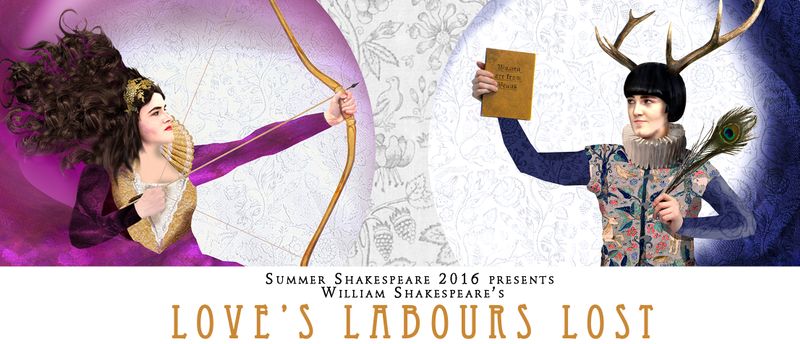Love’s Labour’s Lost, directed by Ania Upstill. The Dell, Wellington Botanic Gardens until 27 February. Tickets here.
The scene is set for a pitched battle at Ania Upstill’s Summer Shakespeare production of Loves’ Labours Lost. We sit along a thrust stage, or rather lawn. At one end sits the stuffy pomp of the Court of Navarre: columns, pedestals and balustrades shaped like closed books. The gentlemen of Navarre have sworn themselves to a period of celibacy, fasting and study, but find themselves besieged by a band of marauding women; the glamorous and witty Princess of France and her entourage set up camp in the opposing corner, in a tent shaped like an upturned flower.
The most obvious quirk of this production is the cross-gender casting. The pretty period costumes bring to mind the theatre practices of yore: young boys playing Shakespeare’s heroines in the 16th Century, women donning breeches in the 17th Century. For contemporary audiences, these cross-gender actors were taken in earnest, though some have speculated that the intrigue of cross-dressing added a risqué element to the proceedings. In this Summer Shakespeare production, the casting gives the opportunity for the actors to lampoon and parody the sexes they are representing. While the direction was clearly to play these characters straight, so to speak, India Rose Loveday, Morgan Collins, Lydia Verschaffelt, and Sarah Burton do an excellent job showing up the vanity of the male leads. Jordan Schmidt, Donald James, Hamish Boyle and Keegan Fitzgibbon play the female leads (who almost always retain the upper hand) with more than a hint of Mean Girls.
Our changing understanding of gender raises some interesting questions about this style of casting. For a growing number of people there is no longer a clear gender-binary to invert, no line of gender to “cross.” For many people, attempting to play the part of a gender that they do not identify with is no game, and learning to perform a gender they do identify with is an ongoing challenge. It is hard to say whether this makes the trope of cross-gender casting hopelessly outdated- even insulting- or whether the light which cross-gender casting shines on the performative nature of gender is more valuable than ever. Even taking the cross-gender casting into account, a simple one-to-one relationship between the genders of the character and the actor can no longer be assumed; “neither of either” one actor quoted slyly after the show “I remit twain.”
Running alongside the battle of the sexes is an amorphous and unruly battle of wits. The ridicule comes in from so many quarters that it is hard to keep track of who exactly we are meant to look down on; the charming page runs linguistic rings around his masters, the illiterate country wench enslaves the nobleman, and the Clown (fantastically played by Hillary Penwarden) deftly dances along the line between fool and wit. The haughty, high-bred academics (such as Brandon Mikel’s exquisitely ridiculous Helofrenes) who heap scorn on their social inferiors are a fine example of the play’s anarchistic intellectual politics. We duly laugh at the clowns pointed out to us by these authority figures (who presume themselves the proprietors of cleverness, with a monopoly on mockery) but their very smugness makes for a far more gratifying spectacle when they face the inevitable retribution: the verbal glitter-bombing, the figurative dildo-to-the-face of well-earned ridicule.









